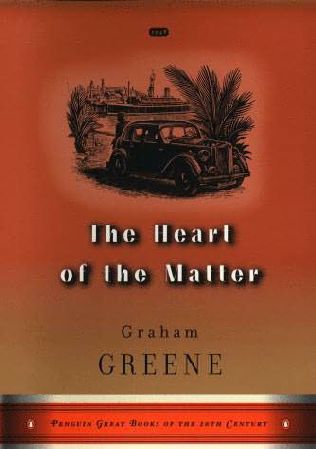 Outside the rest-house he stopped again. The lights inside would have given an extraordinary impression of peace if one hadn't known, just as the stars on this clear night gave also an impression of remoteness, security, freedom. If one knew, he wondered, the facts, would one have to feel pity even for the planets? if one reached what they called the heart of the matter?
Outside the rest-house he stopped again. The lights inside would have given an extraordinary impression of peace if one hadn't known, just as the stars on this clear night gave also an impression of remoteness, security, freedom. If one knew, he wondered, the facts, would one have to feel pity even for the planets? if one reached what they called the heart of the matter?Graham Greene month continues with a book written by the most Greene-like of writers, Graham Greene.
Greene loathed being called a Catholic writer, and preferred to be thought of as a writer and a Catholic--or a Catholic and a writer. But as the best writers cannot help but let their own souls trickle out onto the page, it really is impossible to separate Greene's Catholicism, conflicted but deeply felt, from his writing. He loved to write about strange and exotic places--so much that they call the locations of his books "Greeneland" collectively--but his heroes always seem to have singularly religious struggles that transcend the peculiarity of location.
The Heart of the Matter is set in Sierra Leone, and based on Greene's own time there with the military. Its protagonist is Henry Scobie, a military policeman who does not love his wife but feels a strong responsibility for her happiness, and enters into a shady loan with a Syrian shopkeeper to be able to send her on holiday to South Africa so that she can escape the country she despises. Before this a civilian named Wilson comes to Sierra Leone, who connects to Scobie's wife Louise over a mutual love of poetry, and mistakes their shared passion for romantic love. His hatred for Scobie, as Louise's unloving husband, is magnified when Scobie strikes up an affair with a young shipwrecked girl named Helen while Louise is in South Africa. Throw in the fact that Wilson is secretly commissioned with reporting on the military police regarding the smuggling of diamonds--a business in which Wilson's loanshark trades heavily--and you have a pretty unstable love-square.
But of course, this is a Greene novel, and so there is always another party unseen, but not un-felt: God makes this a love-pentagon. Scobie, like Greene, is a devout Catholic, but this is Sierra Leone during the Second World War and Scobie must struggle with that ancient dilemma, the question of why a benevolent God would create a world with such capacity for misery. Scobie's response is not to entertain thoughts of doubt, but to carry, Christ-like, the burden of responsibility for the happiness of everyone he knows.
Pity is Scobie's fatal flaw. Scobie feels nothing he could call love for Louise, but he is driven mad by her unhappiness--or even by the prospect of her unhappiness. His affair with Helen is repulsively shallow; she, with her mood swings and stamp collection, seems little more than a lovestruck child, and yet he cannot bear the thought of her suffering either. Too late he realizes, when he receives a letter from Louise announcing her return, that he has put himself into a bind, and must cause suffering to either his wife or his lover by abandoning one of them.
What Greene does here is, I think, incredible. In Scobie, he takes what we would consider a positive human trait--a capacity for pity--and transforms it into a viciously destructive flaw. Only a person with a monstrous amount of pride could look upon those he is meant to love and feel nothing but pity, and Scobie feels pity for not just the world but the universe--"If one knew, he wondered, the facts, would one have to feel pity even for the planets?" Scobie has lost sight of one of Christanity's most inexorable truths, that God has offered to place that burden on Himself. How massive must a man's ego be to put his head in God's yoke.
Here Scobie, oppressed by the decisions he must make, looks into a mirror:
He began his search. Once, pausing by a mirror, he saw poised over his own shoulder a stranger's face, a fat sweating unreliable face. Momentarily he wondered: Who can that be? before he realized that it was only this new unfamiliar look of pity that made it strange to him. He thought: Am I really one of those whom people pity?
He pities the planets, but the thought that he might be pitiable comes as a shock. It is no surprise that Scobie cannot succeed in bringing happiness to everyone, and as a result concludes that everyone would be better off without him. As a result, he makes himself the most pitiable character of all.
As a post-script, here's a bit of dialogue I really liked but couldn't work into the review:
"But do you really, seriously, Major Scobie," Dr. Sykes asked, "believe in hell?"
"Oh, yes, I do."
"In flames and torment?"
"Perhaps not quite that. They tell us it may be a permanent sense of loss."
"That sort of hell wouldn't worry me," Fellowes said.
"Perhaps you've never lost anything of importance," Scobie said.
Graham Greene-o-Meter: Ten Greenes out of ten. Nothing like the real thing.

1 comment:
I have this sitting on my bookshelf. I might read it next. Love me some Greene.
Post a Comment